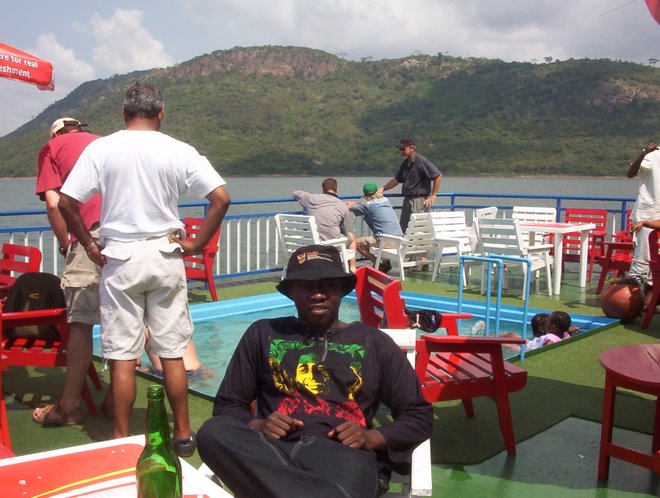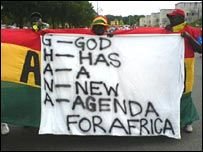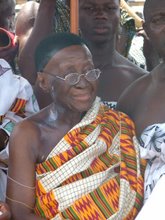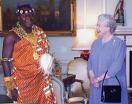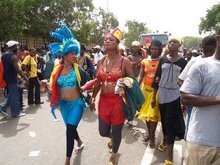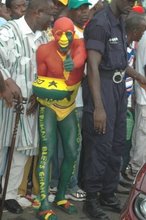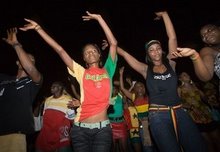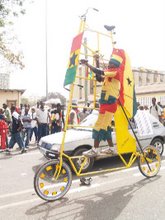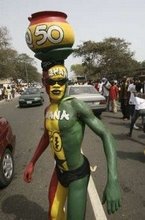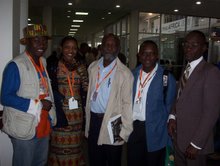Trials and Tribulations of a Kumasi man denizen in Accra
Article: Enoch Darfah Frimpong
I was just about to move the car out of the drive way of the house on a Sunday at about 5:30 p.m. when the telephone rang.
The caller’s ID indicated that the call was from the newsroom in Accra. My immediate reaction was why the News Editor would be calling me at this time of the day. Had he forgotten I was on holiday?
I hope he was not calling to give me an assignment because I was on my way out for an evening with my wife, and wouldn’t want my plans to be disrupted.
As a journalist working in Kumasi with the leading daily newspaper in the country, my private life has always been disrupted in similar manner and fashion, all in the name of the job of getting the news for the public, which sometimes cannot be fun,
but that is the acceptable nature of the job.
When I answered the call, the voice on the other side was that of the General Manager of Newspapers, Mr Yaw Boadu-Ayeboafoh.
“Darfah, how are? Management has decided to transfer you to Accra. We want to improve upon our website and we have decided that you should be transferred there as part of the team. Tell your family and prepare to move to Accra.” This was how the
General Manager gave me the news of my transfer to Accra from Kumasi.
My immediate reaction was, “Oh God, I am dead.” My wife simply could not understand my attitude as I informed her that “my employers have just handed me my punishment.”
What even worsened my plight was when I eventually received an official letter a few days later dated February 21, 2011. Management had asked that I report to my new station on March 21, 2011, meaning I had just a month to prepare to face the trials and tribulations of Accra.
But why is a transfer to Accra viewed as a punishment?
Some people may jump to such an opportunity to work in the capital city, but for someone like me who was born, ‘bread’ and ‘buttered’ in Kumasi, I would certainly not pop champagne over such news.
I had spent some time in Accra for academic purposes, as a student journalist at the Ghana Institute of Journalism (GIJ) where I spent two years for my journalism training and apart from that I have occasionally visited the capital city, either to visit friends and family, for official business or passing through to the airport for international travel but none of those visits had exceeded a one-month stay.
Even though I had thought of being transferred to work in Accra in the future, never had I imagined that the situation would be this immediate. This could somehow be translated as the “Kumasi Thing being too much in me,” with all regards to Deputy Minister Mr Kobby Acheampong.
From my past experiences, coupled with that of colleagues, friends and family and comparing Kumasi to Accra in terms of cost of living, human and vehicular congestion and accommodation problems, I would certainly choose to work in Kumasi over Accra.
A professor friend of mine interpreted the spelling of Accra as, “A-All, C-crazy, C-citizens, R-rehabilitation, A-Area” based on his experiences with the problems of the city.
Most Ghanaians are familiar with the problems of Accra, which is peculiar with that of other cities in developing countries - human and vehicular congestion, accommodation problems and a high cost of living.
Accra is the capital city of Ghana, with a population of about five million. It is also the home base for the government and where most businesses have their head offices. Almost every household in Ghana has some member of the family living in the bustling city.
Before independence, the majority of the population in Ghana were farmers and petty traders but when Ghana became independent in 1957, the government rightly made education its priority and the same has been maintained over the years.
There were only a few secondary schools and just one university before independence but now there are over 500 higher institutions made up of secondary schools, colleges, polytechnics and universities for a population of about 24 million.
Economic reasons and the centralised nature of the government in the capital have compounded the problems of Accra. Uncontrolled migration is the order of the day.
The result is that most people do not want to live in their towns and villages anymore because there are no jobs in these places for the vocations they have trained for and the fact that the lack of basic infrastructure such as electricity or pipe-borne water supplies encourage many a youth to migrate to the centre.
Because everyone wants to live in Accra, the place is overpopulated and expanding fast by the day. The centre, however, cannot hold, because of the population explosion.
This is the reason why I do not want to contribute to worsening the congestion in Accra but to stay in the ‘kooko ase’ and enjoy the peace of living in Kumasi.
The cost of food is reasonable in Accra as compared to major cities in other countries but compared to Kumasi where GH¢4 to GH¢6 could get you a bowl of fufu with bush meat from a local restaurant, you would get a similar dish at GH¢10 or GH¢15 in Accra.
To find a place to rent is a headache. This is made worse by the fact that in almost all places, the rent usually is paid two years in advance just like Kumasi, but Kumasi rates are cheaper. The average rent per month is sometimes more than 30 per cent of one’s income.
I spent the first six months of my stay in Accra perching in a friend’s apartment with his wife and children trying to raise funds to rent my own accommodation. I was able to find a place of my own at Kasoa, courtesy of my father-in-law’s assistance.
While searching for accommodation, I came across single-room apartments on offer at between GH¢70 and GH¢100 as monthly rent, two-bedroom apartments at ranges of GH¢150 to GH¢200 and three-bedrooms at GH¢300 and above in various locations some of which
were in waterlogged areas. In some of the areas, one needs to find a safe haven either in someone’s house, fuel station or a school to park one’s car for the night and walk home.
The two-bedroom apartment I succeeded in securing at Kasoa in the Central Region was offered at a monthly rent of GH¢200 and I had to make a two-year advance payment of GH¢4,800. And this is Kasoa ooo!, not Adabraka, Labone, Dansoman, East Legon or Spintex road.
In Kumasi, I stayed in a four-bedroom apartment in a plush area of the city, Parakuo Estates, near Santasi, at a monthly rent of GH¢180.
Many people have had to live outside Accra and commute on a daily basis because of accommodation problems. This is where the traffic congestion situation comes in.
Back in Kumasi, the taxi drivers refer to it as “go slow.” On the average, I spend five hours each working day in traffic commuting between Kasoa and the Graphic road, but Mondays are extreme. On some days, it takes three to four hours one way, either in the morning or evening.
This traffic problem is not peculiar to only the Mallam junction area but widespread in the entire city from the Spintex road, Nungua road, Achimota-Ofankor, 37 Hospital to Airport, just to mention a few.
On a daily basis, commuters are seen dozing in vehicles because their day starts as early 4.00 a.m. and ends late. Schoolchildren are not spared this menace.
Surprisingly, no one is calculating the man hours lost in traffic which could have been put to productive use.
I remember one Friday evening, I left the office at Graphic road at 6.00 p.m. en route to Kasoa, a distance of about 28km. My wife who had just boarded a bus from Kumasi around 5.00 p.m. was able to get to Kasoa at 10.00 p.m. via Nsawam and Bawjiase, a distance of about 270km, before I got to Kasoa, simply because I was stuck in traffic at Mallam junction.
Another example, again from Kumasi. I was able to wake up at 5:30 a.m. or 6.00 a.m. and within two hours l was able to drive from Parakuo Estates to the gym at Yegoala Hotel at Nhyiaeso for morning exercises, get back to the house for a shower, eat breakfast and get to the office at either 8.00 a.m., or latest by 8:15 a.m. I was able to get back home early, take dinner before 6.00 p.m., either go back to town for an evening out with friends or continue with work if I have an evening assignment. 
That is not to say there is no traffic in Kumasi, but the city has been planned such that commuters who have nothing doing in the centre of the city are able to use the ring road which goes round the city in the outskirts to avoid traffic congestion in the city centre during rush hour. Besides, there is not much congestion in the Kumasi as compared to Accra.
In Accra, if one wants to engage in exercises, as doctors have been prescribing for many people in recent times, and if the person’s work schedule is the same as mine, the person can only exercise on weekends.
And considering that I was transferred to Accra without my conditions of service changing, technically I have become worse off than I was in Kumasi as living expenses in Accra are rather astronomical.
Travelling to Kumasi to visit my family on weekends has also become worse considering that road construction works at the Suhum section of the Accra-Kumasi road have delayed. The journey, which previously took four hours, has now increased to an average of six hours because of the bad nature of the road on the Nsawam to Suhum stretch of the highway, and the usual traffic congestion at Nsawam and Nkawkaw.
These reasons are what accounted for my exclamation “I am dead” when news of my transfer from Kumasi to Accra was given. I envisaged that the cool, relaxed and routine mornings with physical exercises were going to elude me in Accra and indeed that has surely been the case as my weight has jumped from an average of 82 kilos to 90 kilos within seven months of no exercises.
That is not to say that it is not fun working in Accra, which is proud of its cosmopolitan nature. Working in the headquarters is far different from being in the regions where no one gets to see you and responds to your needs instantly aside the myriad of opportunities available for growth on the job and exposure to experience from senior colleagues.
There are a lot of other African immigrants living in the city, who are from as far as Zimbabwe in the south, Libya in the north and from our nearest neighbours: Togo, Ivory Coast and our Nigerian brothers and sisters, most of whom feel at home.
There are some beautiful places in Accra, nice entertainment centres and restaurants, some of which are in the city and others in the outskirts. But of course, there are some 'not so nice' sites as well.
New buildings seem to be springing up everywhere but the average salary earners are priced out of these accommodation facilities. They are just too expensive and the builders claim that one of the reasons for the high cost is because most of the building materials have to be imported.
And there is often no mortgage system by which the purchase of a house can be spread over so many years. So before one moves into his/her new home, one must have paid the total price or almost 50 per cent of it.
Now there are new schemes to enable middle class families to own their own homes. The scheme is rudimentary but it is hoped that in the near future, people with regular traceable employment may also be able to qualify for mortgages.
One of the downsides in the city is that there are not many jobs and it is worrying to see young men and women hanging around the streets; usually selling whatever they can lay their hands on in order to have their daily bread.
Most of these young people usually sell on the main roads in areas where they know traffic lights can stop the flow of traffic for a few minutes and then they will rush to the drivers or passengers in the vehicles hoping to make a sale. This hawking is risky business and hardly a week passes without somebody sustaining serious injuries or even being killed. This situation is also common in Kumasi.
Accra was congested around year 2000 when I was in the city for my journalism training and between that period and now, a number of road projects, expansion of roads and the construction of interchanges have been done to help reduce the traffic congestion but the problem still persists.
It is likely that irrespective of how we try to solve the problem, we may not be able to succeed because of the lack of land space.
This is the reason why we need to start making concrete plans of looking at a new capital city away from Accra. Some people have suggested Kintampo, which is located in the centre of Ghana, others have suggested Sunyani and Tamale.
In all these, the fact remains that Accra would not be able to cope with the pressure in future. The time to act and get a concrete plan going is now.


















